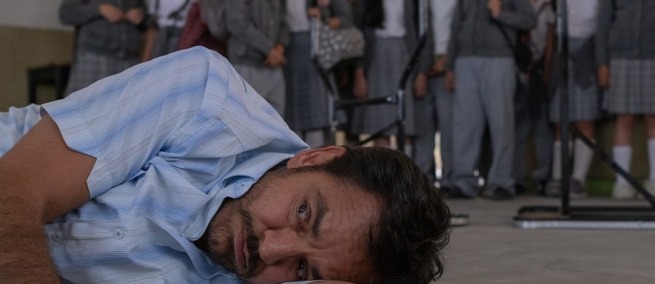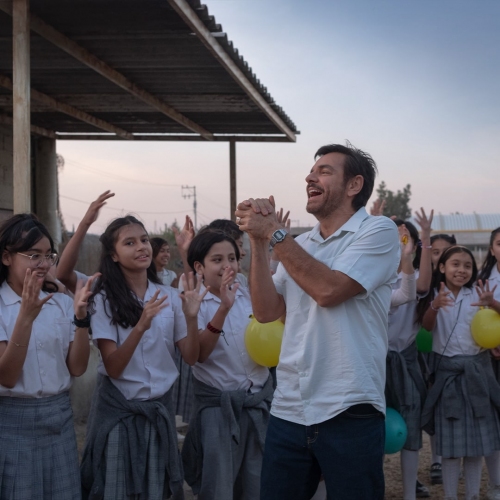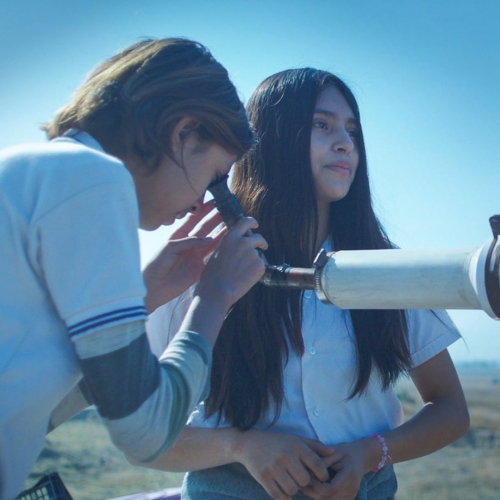
Winner of the Festival Favorite Award at the 2023 Sundance Film Festival, and the Sloan Distribution Grant through Film Independent, RADICAL is inspired by the true story of a teacher in a Mexican border town with few resources who tries a new teaching method. The film stars Eugenio Derbez, who is also one of the film’s producers. It is written and directed by Christopher Zalla, and will be released nationwide in the U.S. starting November 3. We spoke with Zalla about the story that inspired the film, his directorial approach, and why this teaching method is still radical.
Science & Film: My understanding is that your interest in this story was sparked by a Wired article from 2013. What struck you most about the story?
Christopher Zalla: The Wired magazine article was acquired by Ben Odell, the producer, and Eugenio [Derbez] the producer, they're partners at 3Pas Studios. We had actually all worked together on my first movie, which was my thesis film for grad film school, and it ended up going on to win Sundance, which almost felt like an accident. But, at that moment, Eugenio was already looking to break into the US market, and I remember he told me on the red carpet at Sundance: someday, I'm going to find a drama, and I'm gonna call you. The big joke is it just took him 15 years.
They ended up sending me the article at the end of 2018. It’s an incredible story in the article, it's almost hard to believe. As I'm reading it, I'm almost stealing myself against it, and I cried like three times—there were just these magical moments in it that I really connected to. It's about a guy who had a crisis in the middle of his life and decided to start over, which was like a situation that I was finding myself in at the time. I got the script when I was living on a mountain-side lake in Guatemala, my house is only reachable by footpath or boat because I completely checked out to kind of restart. And so, I did very much identify with this character, who was trying something else, trying to restart. But then also in that process, I had become a father. There's something that's both so magical and inspiring, but also, to me, so heartbreaking, because on some level, you know, life is waiting in front of them and as aspirational as we can be, life is this constant corrective force.
I really wanted to focus [the film] on how [this method] worked. What did he do? What if, unlike these other teacher movies, I tell it from the from the kids' eyes? We literally enter the world with them, we are them, the camera never goes higher than their height.

Still from RADICAL
S&F: Can you talk more about your approach in terms of craft and direction?
CZ: We were always trying to create tension with oppositional forces, and so when we see the kids out in their world, there are these wider, static, kind of tableau shots. There was literally a fetid canal right next to the school that just didn’t move, and it's full of trash. To me, that was a metaphor for where we start the world, which is stasis and status quo. There's no movement, there's no possibility. And then, the contrast is when we meet Sergio. It's frenetic and there's jump cutting. Every time we cut to Sergio, I would jump several frames further than I should have so that he just had this little pop, like, where is he? It creates this energy that can combat the status quo and start to open it up. From a framing standpoint, we cut off all the adults at the chest level.
There is a history of a kind of a teacher movie, which, by the way, we have not seen nearly enough of—the real superhero movie. But these films always cut to the kids when they didn't know calculus, and now they do—cut, cut, cut. And I thought, wouldn't it be amazing if we could just be in a room and watch the light get turned on from the teacher's standpoint, and how do the kids have that happen for them? Tell that from both perspectives.
One big takeaway from this process has been that those of us who had a teacher like that get it. But on the other hand, there are people who've never had that kind of teacher and my heart breaks for them—what a horrible thing not to have experienced. But on the other hand, that's the reason we're telling this story.
S&F: Since the Wired article came out, and since you've been in production with this film, to what extent is the approach you depict in your film still radical?
CZ: It's still absolutely radical. It shouldn't be, but it is. What it was really all about, I've come to see through the filmmaking, was a hypothesis. I ended up having Sergio on set next to me, and I saw something that confirmed the hypothesis. For me, it was the simple change of instead of being the authority who looks down at you and says: do this, do that sit in the chair, only raise your hand when you're spoken to, memorize these things. Education is this prescriptive path that you have to follow, do not deviate from the plan… Versus somebody saying: Hey, what are you interested in? What do you what do you want to learn about? And then showing them that their curiosity gets rewarded with discovery, which becomes its own self-fulfilling motor. It's that joy of discovery that to me is the essence of youth. Ironically, although we filmed these kids at this [chest] level, I saw them very much as kids who weren't able to be kids. When I think about adults who are still so alive, those are the ones who are still learning. That’s the energy that I think Sergio brings. But most profoundly, it's valuing them. It's saying, what you think is actually valuable. Being genuinely interested in their ability to think, that's the skill that we're going to teach you in life: to be a thinker, to be curious, to ask questions, and by the way, don't worry about failure, that's part of it. This is what I wanted to get into in the nitty gritty of in the movie and the storytelling. And when I had Sergio next to me on set, he was there for several weeks, he's the real deal, the guy's just a saint, there's no other way to put it. But his phone was like blowing up all the time. I asked, what's going on? All his students over the last 15-20 years are in constant contact with him. And it's like, that's what he did.

Still from RADICAL
S&F: As the field of technology is changing, and as artificial intelligence is being introduced into the classroom, do you have thoughts on how those kind of methods intersect with the subjects you're dealing with in RADICAL?
CZ: The guy who inspired Sergio, Sugata Mitra, he says, a teacher that can be replaced, should be replaced. We allude to it in the movie when Sergio says: they don't even need me, they just need computers. Of course, they have no computers, so it's a bit of a problem. I'm just inherently wary of artificial intelligence. I do think there's this extraordinary opportunity in places with very low resources, especially rural communities. If they have phone signals, then that does become a pathway through which they can access the internet. If you set a kid on that path to curiosity, investigation, discovery, even through that phone, it can be extremely, extremely rewarding. The irony is, Mitra started this thing called The Granny Cloud and it's thousands of women in England who are Zooming with kids in India, and their entire job is to say, Wow, that's amazing. How did you do that? The great irony is that Sergio thinks the kids don't need him and in fact, they very much do, because it's still that human thing; having someone believe in you is really, really helpful.
♦
FILMMAKERS
PARTNERS
TOPICS